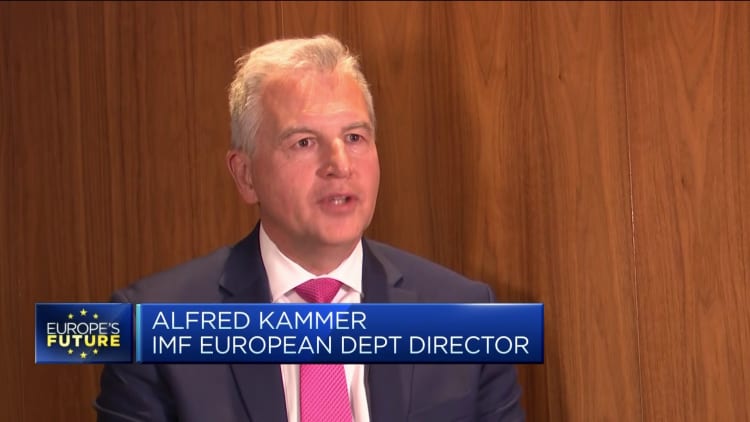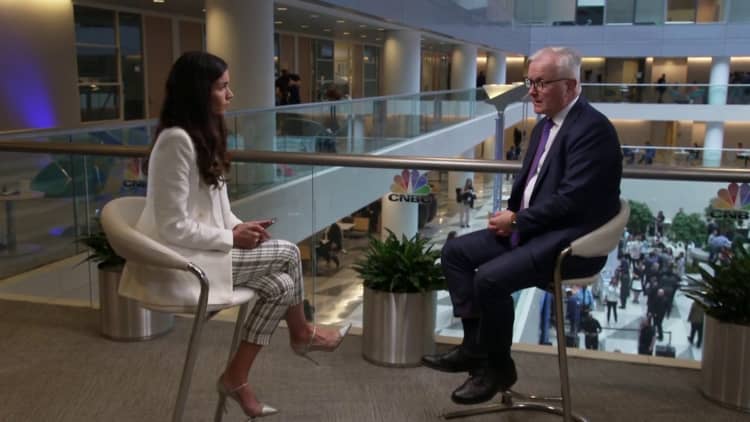Skyscrapers of the city center can be seen from the Lohrberg in the north of Frankfurt. Photo: Arne Dedert/dpa (Photo by Arne Dedert/picture alliance via Getty Images)
Picture Alliance | Picture Alliance | Getty Images
The euro zone economy grew by a marginal 0.1% in the first quarter of the year, preliminary figures showed on Friday, even as Germany’s GDP flatlined over the period.
The print came in below analyst expectations, with a Reuters poll of economists previously forecasting quarterly growth of 0.2%. The economy expanded by 1.3% on an annual basis, just missing an outlook of 1.4%.
Earlier this month, statistics agency Eurostat had revised down its fourth-quarter 2022 GDP estimate for the euro zone from 0.1% quarterly growth to no growth, following 0.4% growth in the third quarter.
The slight first-quarter growth signal comes as economic performance contends with persistently high inflation. Energy prices have been a key driver over the past year, as European consumers progressively lost access to Russian supplies in the wake of Moscow’s full-scale invasion of Ukraine. Carsten Brzeski, global head of macro at Dutch bank ING, said that the fall in wholesale energy prices, warmer-than-expected weather and fiscal stimulus had helped the bloc dodge a widely-feared recession over the winter.

But he noted significant disparities between individual countries, and said that future growth would be impacted by an ongoing race between positive momentum in industry and wage growth on the one hand, and European Central Bank monetary tightening and U.S. recession risks on the other.
Divergence
Europe’s leading economies diverged in their first-quarter performance, national figures showed on Friday. The German economy stagnated over January-March, compared with the previous three-month period. It was up 0.2% on an annual adjusted basis and 0.1% lower on a non-adjusted basis due to one extra working day in the prior year, German statistics agency Destatis said.
Deutsche Bank economists said Germany had avoided a technical recession by a “hair’s breadth” and reiterated their call of 0% GDP growth this year, with the economy held back by high inflation, rate hikes and an expected second-half U.S. recession.
France’s GDP meanwhile picked up by 0.2% in the first quarter, Insee statistics revealed, despite a spate of widespread strikes that slowed activity sparked in protest of President Emmanuel Macron’s planned pension reforms.
The Irish GDP was a notable weak spot, declining by 2.7% on the previous quarter, while Portugal’s economy grew by 1.6%.
Policy stake
The GDP figures will be keenly watched ahead of the May 4 meeting of the ECB, which seeks to tackle headline inflation of 6.9% and core inflation at a record high of 5.7%.
Some ECB policymakers have stressed they believe they have further to go on interest rate rises as they weigh up a 25 basis point or even 50 basis point hike next week. The March collapse of several lenders across the U.S. and Europe and ensuing turmoil in the banking sector had ignited questions whether central banks would be forced to slow or walk back their interest rate increases.

The ECB most recently raised its three key interest rates by 50 basis points in March, taking the main rate to 3%.
Nerves on the European front have largely settled and officials have underlined the strength of the sector, though the shadow of deposit flights and further volatility remains.
Stay connected with us on social media platform for instant update click here to join our Twitter, & Facebook
We are now on Telegram. Click here to join our channel (@TechiUpdate) and stay updated with the latest Technology headlines.
For all the latest World News Click Here
